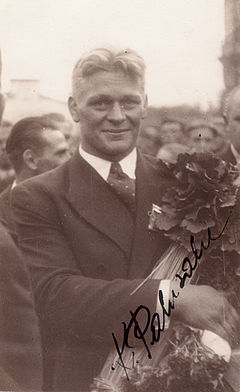Kristjan Palusalu
 |
||||||||||||||||||||||||||||
| Personal information | ||||||||||||||||||||||||||||
|---|---|---|---|---|---|---|---|---|---|---|---|---|---|---|---|---|---|---|---|---|---|---|---|---|---|---|---|---|
| Born |
10 March 1908 Varemurru, Saulepi Parish, Lääne County, Russian Empire |
|||||||||||||||||||||||||||
| Died | 17 July 1987 (aged 79) Tallinn, Estonia |
|||||||||||||||||||||||||||
| Height | 1.85 m (6 ft 1 in) | |||||||||||||||||||||||||||
| Weight | 110 kg (240 lb) | |||||||||||||||||||||||||||
| Sport | ||||||||||||||||||||||||||||
| Sport | Wrestling | |||||||||||||||||||||||||||
| Event(s) |
Greco-Roman Freestyle |
|||||||||||||||||||||||||||
| Club | Sport Tallinn | |||||||||||||||||||||||||||
| Coached by | Anton Ohaka | |||||||||||||||||||||||||||
|
Medal record
|
||||||||||||||||||||||||||||
Kristjan Palusalu (until 1935 Kristjan Trossmann, 10 March [O.S. 26 February] 1908 – 17 July 1987) was an Estonian heavyweight wrestler and Olympic winner. Palusalu became the first and only wrestler in Olympic history ever to win both the Greco-Roman and freestyle heavy weight events.
Born in Varemurru village, Saulepi Parish, Lääne County (now Matsi village, Varbla Parish, Pärnu County), Palusalu is best remembered for winning two gold medals at the 1936 Olympic Games in Berlin. He was given the honor of carrying the Estonian flag to the olympic stadium. The triumph was celebrated across Estonia with Palusalu and other Estonian athletes touring the country by rail giving speeches. A third of the inhabitants of Tallinn turned out to greet him and the Estonian government granted him a farm.
After the Soviet Union occupied Estonia in 1940, Palusalu was sent to hard labour in Kotlas, Russia in 1941. He tried to escape with other prisoners but was captured after a few days. He was then sentenced to death together with his fellow fugitives but was given the chance to go to the front line to fight against Finland in the Continuation War. He deserted to the Finnish side in Northern Karelia, northwest of Lake Onega. According to one Finnish soldier, Mr. Suuperko, Palusalu and his friends shouted "Finnish boys do not shoot Estonians", when they crossed the lines. Palusalu was soon recognized by a person in the Finnish army, who had sports background (Heikki Savolainen).
...
Wikipedia
